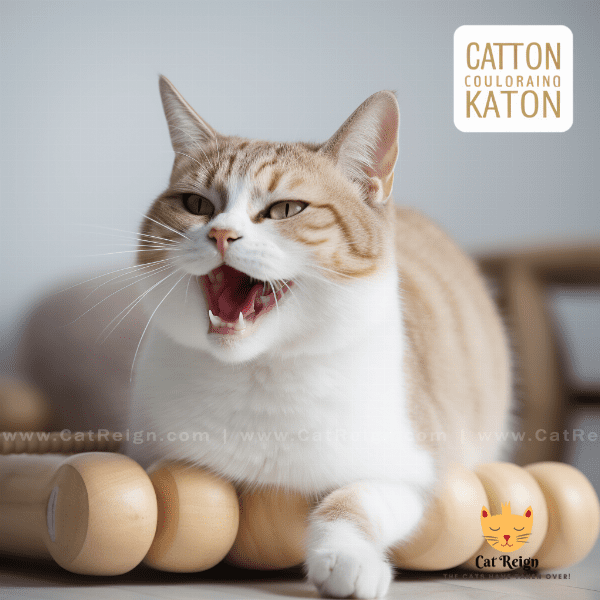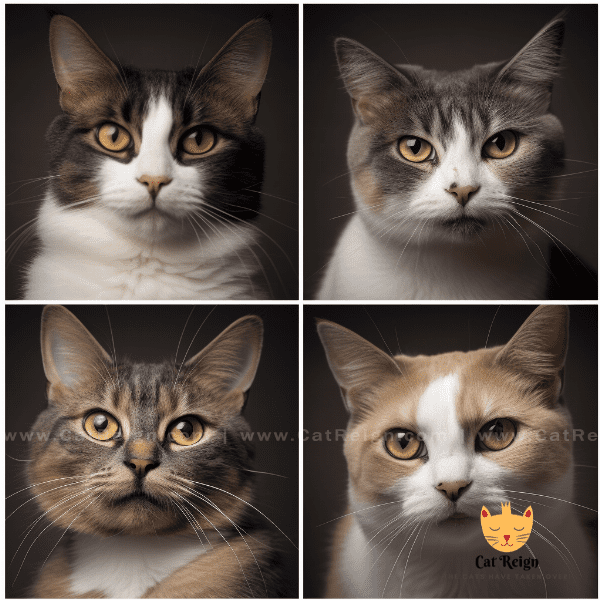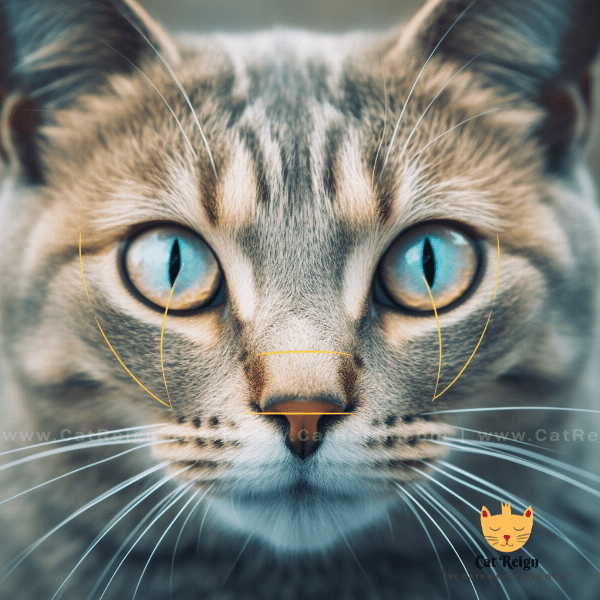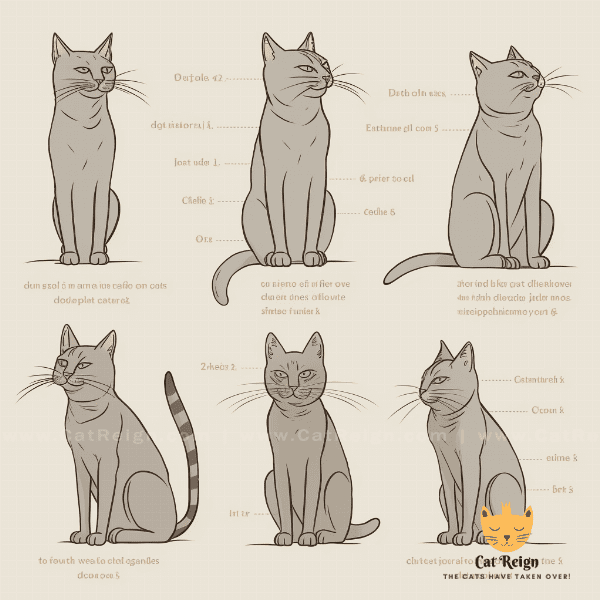Table of Contents
- Common signs of sickness in cats
- Interpreting your cat’s body language
- Tips for understanding your sick cat’s behavior
- How to provide comfort to a sick cat
- Understanding your cat’s vocalizations
- When to seek veterinary care for your sick cat
- Helping your cat recover from illness
- Creating a comfortable environment for your sick cat
- The importance of regular check-ups for your cat’s health
- Preventative measures for maintaining your cat’s health
Common signs of sickness in cats
Cats are masters of hiding their discomfort, so it’s essential to be aware of the signs that your feline friend may be sick. Here are some common signs to look out for:
Changes in appetite and water intake
A noticeable change in your cat’s appetite and water intake can indicate a health issue. A lack of appetite or an increase in thirst can be a sign of kidney problems, diabetes, or other illnesses.
Unusual vocalizations
Cats communicate through various vocalizations, from meowing to purring. If your cat’s vocalizations change significantly or become more frequent, it may be a sign of discomfort or illness.
Changes in body language
Cats have a complex language of their own, and changes in their body language can be a sign of illness. A hunched posture, lack of grooming, or hiding can all indicate that your cat is feeling unwell.
Remember, early detection is key when it comes to treating illnesses in cats. If you notice any of these signs, it’s essential to seek veterinary care promptly.
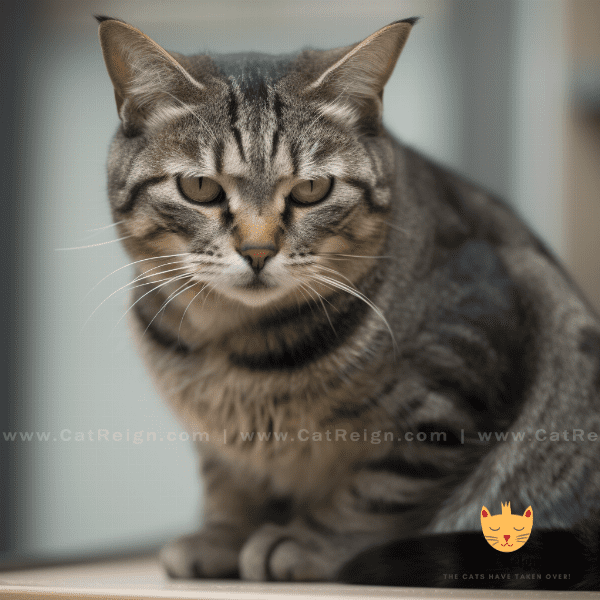
Interpreting your cat’s body language
Cats use body language to communicate their emotions, needs, and wants. Here are some common feline body language cues and what they mean:
Tail position
A cat’s tail can communicate a range of emotions. A tail held high indicates confidence and happiness, while a tucked tail indicates fear or anxiety. Twitching or lashing of the tail can indicate agitation or annoyance.
Ear position
A cat’s ears can also indicate their mood. Ears held high and forward indicate alertness and interest, while flattened ears indicate fear or aggression. A cat with relaxed ears is likely content and relaxed.
Purring
Purring is often associated with contentment and happiness, but it can also indicate pain or discomfort. If your cat is purring loudly and you notice other signs of distress, such as hunching or reluctance to move, it’s essential to seek veterinary care.
Grooming
Cats are fastidious groomers, and changes in grooming habits can be a sign of an underlying health issue. A cat that is grooming excessively or not grooming at all may be experiencing discomfort or illness.
Eye contact
Direct eye contact from a cat is a sign of trust and affection, while avoiding eye contact can indicate fear or anxiety.
By learning to interpret your cat’s body language, you can better understand their needs and wants. If you notice any changes in your cat’s behavior or body language, it’s essential to pay attention and seek veterinary care if necessary.
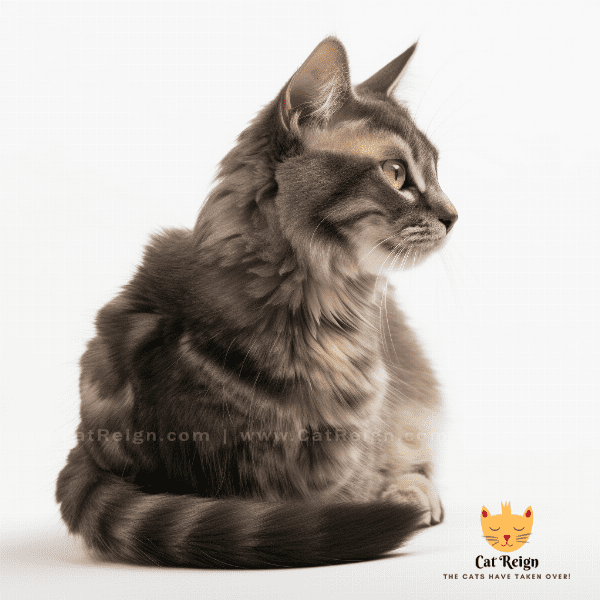
Tips for understanding your sick cat’s behavior
When your cat is sick, it can be challenging to understand their needs and behavior. Here are some tips to help you navigate this difficult time:
Pay attention to changes in behavior
As mentioned earlier, cats are experts at hiding their discomfort, but changes in behavior can be an indicator of sickness. Watch for changes in appetite, energy levels, grooming habits, and litter box behavior.
Monitor their vital signs
If you suspect your cat is sick, it’s essential to monitor their vital signs, such as body temperature, heart rate, and breathing. You can learn how to do this at home or seek assistance from your veterinarian.
Provide comfort and reassurance
When cats are sick, they may feel scared or vulnerable. Providing a comfortable and reassuring environment can help ease their stress and promote healing. Offer a warm, quiet place to rest, and spend extra time cuddling and comforting your feline friend.
Be patient and observant
Sick cats may take longer to recover than healthy cats, and it’s essential to be patient and observant during the recovery process. If you notice any concerning changes or behaviors, contact your veterinarian immediately.
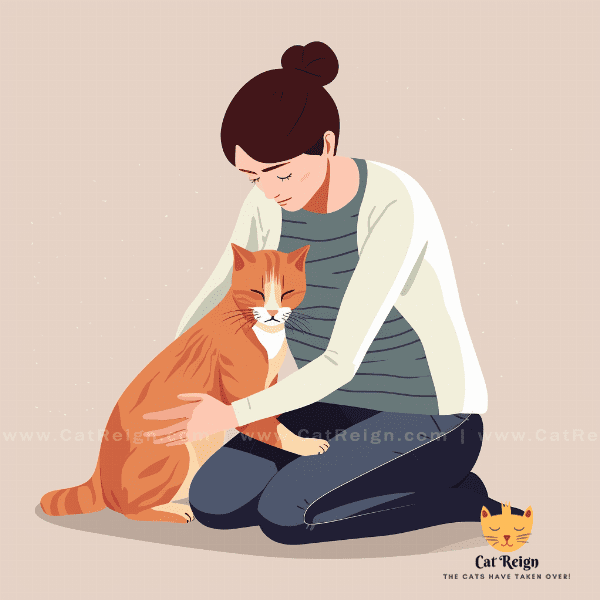
How to provide comfort to a sick cat
When your cat is sick, providing comfort and care is essential. Here are some tips for making your feline friend feel better:
Create a cozy and quiet environment
Cats appreciate a quiet and peaceful environment, especially when they’re feeling sick. Make sure your cat has a warm and comfortable place to rest, away from noise and activity.
Offer tasty and nutritious food
Sick cats may have a reduced appetite, so offering tasty and nutritious food is crucial. You can try offering different types of wet or dry food or even home-cooked meals. Consult with your veterinarian for dietary recommendations.
Keep them hydrated
Sick cats need to stay hydrated, so make sure your cat has access to fresh water at all times. You can also offer wet food, which has a higher moisture content.
.
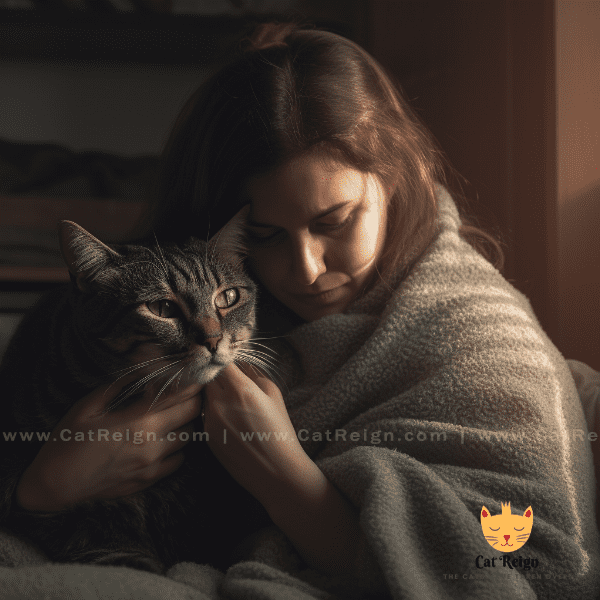
Understanding your cat’s vocalizations
Cats use various vocalizations to communicate with their owners and other feline friends. Here are some common types of cat vocalizations and what they mean:
Meowing
Meowing is one of the most common vocalizations cats use. It can mean a variety of things, from a simple greeting to a request for attention or food. Older cats may meow more frequently as they become more vocal in their old age.
Purring
Purring is often associated with contentment and happiness, but it can also indicate pain or discomfort. A cat may purr to soothe themselves when they’re in pain or anxious.
Hissing
Hissing is a defensive vocalization that cats use when they feel threatened or scared. A hissing cat may arch their back and flatten their ears to indicate that they’re feeling defensive.
Yowling
Yowling is a loud and drawn-out vocalization that cats use to get attention or indicate their distress. A yowling cat may be hungry, in pain, or experiencing anxiety.
Chirping
Chirping is a unique vocalization that some cats use when they’re feeling playful or excited. It’s often used in combination with other behaviors, such as hunting or playing.
By paying attention to your cat’s vocalizations, you can better understand their needs and wants. Remember, every cat is unique, and they may use vocalizations differently. If you notice any changes in your cat’s vocalizations or behavior, contact your veterinarian for advice.
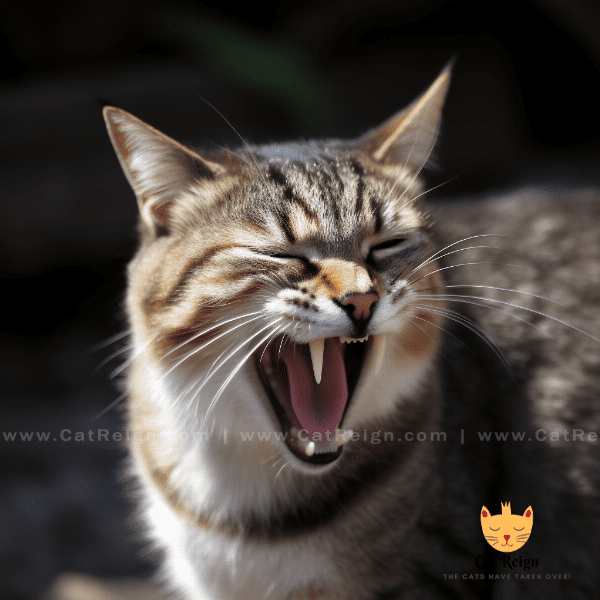
When to seek veterinary care for your sick cat
Sick cats require prompt veterinary care to ensure they receive the appropriate treatment and recover quickly. Here are some signs that indicate you should seek veterinary care for your sick cat:
Changes in appetite or water intake
A noticeable change in your cat’s appetite or water intake can be a sign of an underlying health issue. If your cat is refusing food or water, it’s essential to seek veterinary care immediately.
Lethargy or lack of energy
If your cat is sleeping more than usual or not engaging in their typical activities, it may be a sign of an underlying health issue. Lethargy can be a symptom of a variety of illnesses and requires prompt veterinary attention.
Changes in litter box behavior
Changes in your cat’s litter box behavior can indicate a range of health issues, from urinary tract infections to gastrointestinal problems. If your cat is having difficulty urinating or defecating, seek veterinary care promptly.
Vomiting or diarrhea
Vomiting and diarrhea can be a sign of a variety of health issues, from a simple upset stomach to more serious conditions like pancreatitis. If your cat is experiencing these symptoms, seek veterinary care promptly.
Signs of pain or discomfort
Cats are good at hiding their discomfort, so signs of pain or discomfort should be taken seriously. If your cat is limping, crying out, or showing signs of discomfort, seek veterinary care promptly.
Remember, the earlier you seek veterinary care for your sick cat, the better their chances of making a full recovery. If you notice any concerning changes or symptoms, contact your veterinarian immediately.
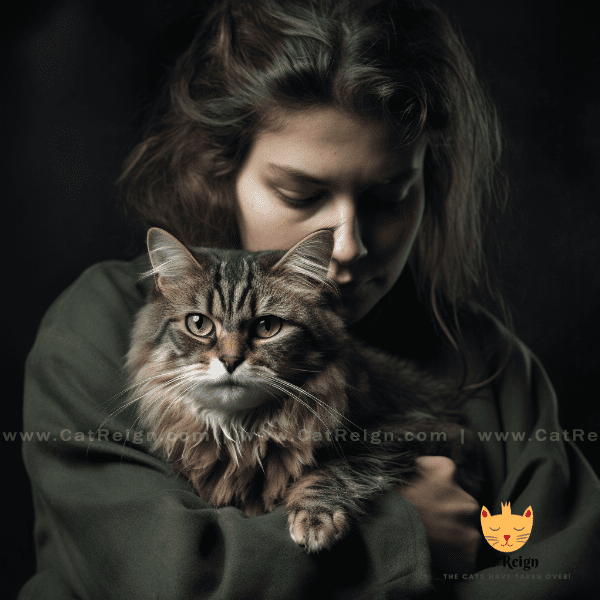
Helping your cat recover from illness
When your cat is sick, it’s essential to take steps to help them recover. Here are some tips for aiding your feline friend’s recovery:
Encourage rest and relaxation
Cats need plenty of rest to recover from illness, so make sure your cat has a warm and comfortable place to rest. You can also provide cozy bedding and toys to help your cat feel more comfortable and relaxed.
Monitor their condition
It’s essential to monitor your cat’s condition closely during the recovery process. Keep track of their appetite, energy levels, and litter box behavior. If you notice any concerning changes, contact your veterinarian.
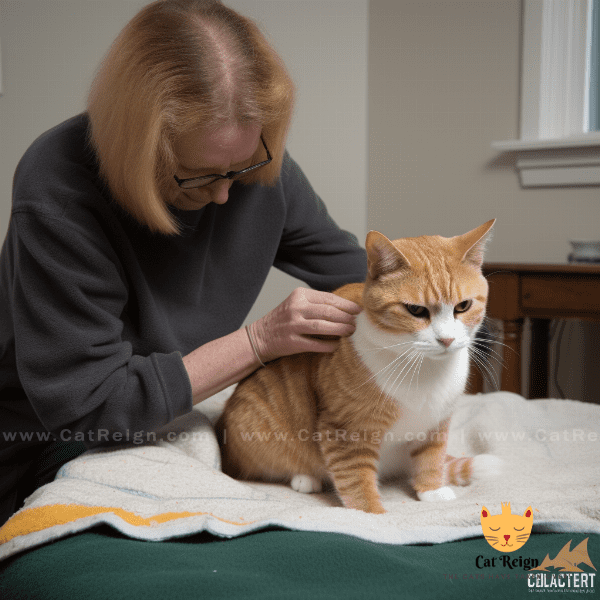
Creating a comfortable environment for your sick cat
When your cat is sick, providing a comfortable and stress-free environment is crucial to their recovery. Here are some tips for creating a comfortable environment for your sick cat:
Provide a warm and cozy resting place
Cats need a warm and comfortable place to rest when they’re sick. Provide a cozy bed or blankets in a quiet and peaceful location away from noise and activity.
Offer a litter box with low sides
If your cat is experiencing mobility issues, offering a litter box with low sides can make it easier for them to use. Make sure to clean the litter box regularly to prevent the spread of germs.
Create a soothing atmosphere
Cats appreciate a peaceful and calming environment, especially when they’re sick. Play calming music or white noise to help your cat relax, and avoid sudden loud noises or bright lights.
Keep the temperature comfortable
Sick cats may be more sensitive to temperature changes, so make sure the room is kept at a comfortable temperature. Avoid placing your cat in direct sunlight or near drafty areas.
Provide plenty of love and attention
By creating a comfortable environment for your sick cat, you can help promote their healing and ensure a speedy recovery. Remember to seek veterinary care promptly if you suspect your cat is sick or in pain.

The importance of regular check-ups for your cat’s health
Regular veterinary check-ups are essential for maintaining your cat’s overall health and detecting any underlying health issues early. Here are some reasons why regular check-ups are important:
Early detection of health issues
Regular check-ups allow your veterinarian to detect any underlying health issues early, before they become more serious. This can help prevent more extensive and costly treatments down the line.
Preventative care
Regular check-ups also allow your veterinarian to provide preventative care, such as vaccinations, parasite control, and dental cleanings. These preventative measures can help keep your cat healthy and prevent the spread of infectious diseases.
Monitoring of chronic conditions
If your cat has a chronic health condition, such as diabetes or kidney disease, regular check-ups are even more crucial. Your veterinarian can monitor your cat’s condition and adjust their treatment plan as needed.
Maintaining optimal weight and nutrition
Regular check-ups can also help you maintain your cat’s optimal weight and nutrition. Your veterinarian can provide dietary recommendations and monitor your cat’s weight and body condition.
Building a relationship with your veterinarian
Regular check-ups also allow you to build a relationship with your veterinarian and their staff. This can make it easier to seek veterinary care when your cat is sick or injured.
By scheduling regular veterinary check-ups, you can help keep your cat healthy and ensure a long and happy life together. Consult with your veterinarian about how often your cat should be seen based on their age and health status.
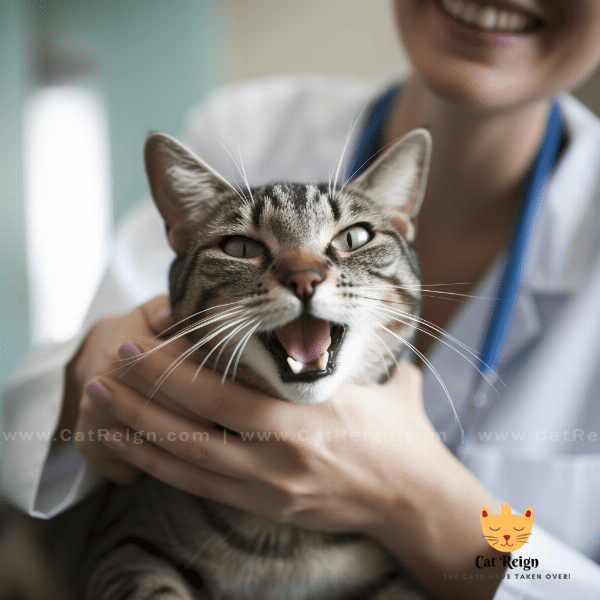
Preventative measures for maintaining your cat’s health
Preventative measures can help keep your cat healthy and prevent the development of health issues. Here are some tips for maintaining your cat’s health:
Annual veterinary check-ups
As mentioned earlier, annual veterinary check-ups are crucial for maintaining your cat’s health. During these check-ups, your veterinarian can detect any underlying health issues and provide preventative care.
Vaccinations
Vaccinations can help protect your cat from a range of infectious diseases. Your veterinarian can provide recommendations on which vaccinations your cat needs based on their age, health status, and lifestyle.
Parasite prevention
Fleas, ticks, and other parasites can cause a range of health issues in cats, from skin irritation to more serious illnesses. Your veterinarian can recommend preventative measures to help protect your cat from these pests.
Dental care
Dental care is essential for maintaining your cat’s overall health. Regular teeth cleanings and at-home dental care can help prevent gum disease, tooth decay, and other oral health issues.
Nutritious diet
A healthy and nutritious diet can help keep your cat at a healthy weight and prevent the development of health issues. Consult with your veterinarian for dietary recommendations and offer a variety of wet and dry food options.
Regular exercise
Regular exercise can help keep your cat at a healthy weight and promote their overall health and well-being. Offer toys and playtime to help keep your cat active and engaged.
By taking these preventative measures, you can help keep your cat healthy and prevent the development of health issues. Remember to consult with your veterinarian about your cat’s specific health needs and how to maintain their optimal health.
